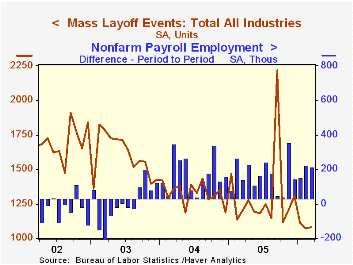 Global| Apr 21 2006
Global| Apr 21 2006Mass Layoffs Remained Low in March
by:Tom Moeller
|in:Economy in Brief
Summary
The number of mass layoff events last month ticked up 0.8% after sharp declines during the prior two months. During all of 1Q, the number of events fell 9.9% from 4Q 2005. During the last ten years there has been a (negative) 87% [...]

The number of mass layoff events last month ticked up 0.8% after sharp declines during the prior two months. During all of 1Q, the number of events fell 9.9% from 4Q 2005.
During the last ten years there has been a (negative) 87% correlation between the three month average level of layoff announcements and the y/y change in payroll employment.
The number of persons affected in December by mass layoffs increased a larger 6.4% during March after a 2.9% February rise. Nevertheless, the 1Q level was down 9.7% from 4Q 2005. Layoffs in the transportation equipment sector (+10.4% y/y) have been significant and quite volatile m/m.
The Mass Layoff Statistics (MLS) program collects reports on mass layoff actions that result in workers being separated from their jobs. Monthly mass layoff numbers are from establishments which have at least 50 initial claims for unemployment insurance (UI) filed against them during a 5-week period.
Company mass layoffs: The "other" job shock from the Federal Reserve Bank of Minneapolis is available here.
| Mass Layoffs | Mar | Feb | Y/Y | 2005 | 2004 | 2003 |
|---|---|---|---|---|---|---|
| All US Industries (# Events, SA) | 1,082 | 1,073 | -10.1% | 15,699 | 15,926 | 19,220 |
| Total (# Persons, SA) | 118,555 | 111,468 | -11.5% | 1,722,452 | 1,591,081 | 1,946,548 |
Tom Moeller
AuthorMore in Author Profile »Prior to joining Haver Analytics in 2000, Mr. Moeller worked as the Economist at Chancellor Capital Management from 1985 to 1999. There, he developed comprehensive economic forecasts and interpreted economic data for equity and fixed income portfolio managers. Also at Chancellor, Mr. Moeller worked as an equity analyst and was responsible for researching and rating companies in the economically sensitive automobile and housing industries for investment in Chancellor’s equity portfolio. Prior to joining Chancellor, Mr. Moeller was an Economist at Citibank from 1979 to 1984. He also analyzed pricing behavior in the metals industry for the Council on Wage and Price Stability in Washington, D.C. In 1999, Mr. Moeller received the award for most accurate forecast from the Forecasters' Club of New York. From 1990 to 1992 he was President of the New York Association for Business Economists. Mr. Moeller earned an M.B.A. in Finance from Fordham University, where he graduated in 1987. He holds a Bachelor of Arts in Economics from George Washington University.
More Economy in Brief
 Global| Feb 05 2026
Global| Feb 05 2026Charts of the Week: Balanced Policy, Resilient Data and AI Narratives
by:Andrew Cates






